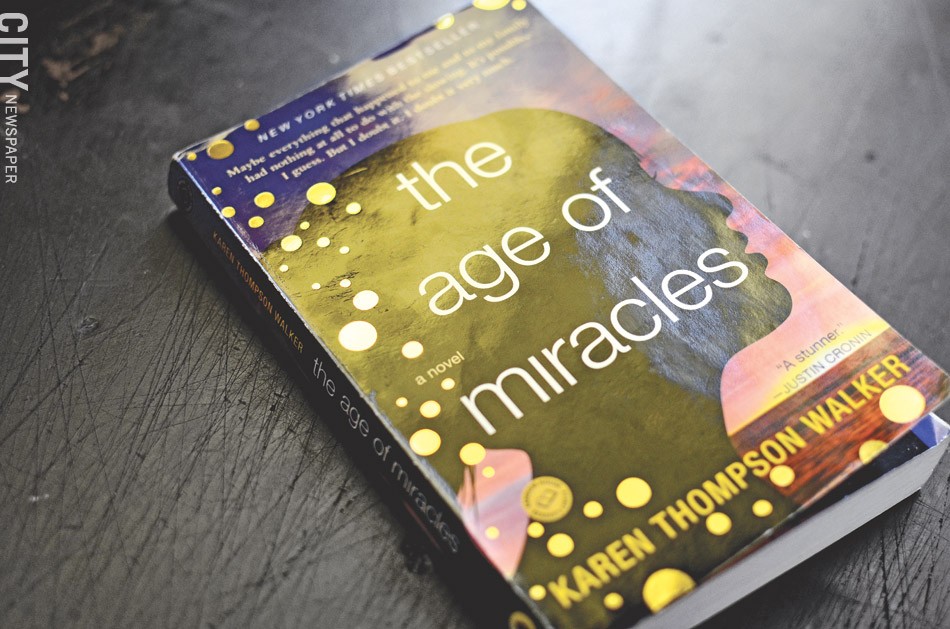While the daily dramas of our lives take center stage, it's easy to take certain big things for granted, like the qualities that make Earth a "Goldilocks" situation for life as we understand it. In her debut novel, "Age of Miracles," Karen Thompson Walker paints an intimate picture of humanity trudging through a great and unstoppable planetary shift, with an unpredictable future. The work is this year's selection for Writers & Books' "If All of Rochester Reads the Same Book...," and Walker will visit Rochester next week to give a series of readings and book signings.

- File photo
"It is never what you worry over that comes to pass in the end," muses Julia, Walker's pre-teen protagonist, who narrates — as a young adult looking back — the beginning of the end of the world through the course of one school year. The story's premise is that Earth's rotation has mysteriously begun to slow, and throughout the book, the days and nights gradually stretch longer, the periods of daylight and nighttime becoming unanchored from our measurements of time.
"We did not sense at first the extra time, bulging from the smooth edge of each day like a tumor blooming beneath skin," Julia says. "We were distracted back then by weather and war."
Some claimed to have felt the gradual change, but when officials confirm the multiplying of minutes, humanity is catapulted back to helplessness and chaos. "We were, on that day, no different from the ancients, terrified of our own big sky," Julia narrates.
The progression of strange phenomena — birds dropping from the sky, tides radically changing, snow in California — facilitates an increasingly loud static of background anxiety, which manifests differently in different characters. All the while, Julia is dealing with painful and confusing changes that come with being in the special hell that is middle school.
Our cultural fascination with post-apocalyptic life has injected countless iterations of the fantasy into our pop cultural entertainment avenues. It's less common for writers to do what Walker does: explore what humanity might go through on the journey toward the end.
This approach has a fascinating social-experiment element. We've seen versions of it in H.G. Wells' short story, "The Star," and David Bowie's song "Five Years," both of which glance at a pandemonium-stricken society living under the world's looming doom. Lars von Trier's film, "Melancholia," explores the premise more intimately, through a small group of characters.
"The Age of Miracles" too tackles the time period when people know that something is up, and that it's probably bad, but are in the dark about what exactly is going to happen to them. Global catastrophes unfold over the backdrop of the mundane, which gives the storytelling a richer feel.
"I was also interested in writing about what it's like to live with this sense of uncertainty and fear," Walker says. "And trying to imagine how people might carry on with their daily lives, even in the face of radical uncertainty."
Walker wanted the story to be about humans. "It's about how they do and don't deal with this disaster, as much as it is about the disaster," she says.
Everything is changing for Julia, who has to deal with ordinary coming-of-age strife even as the pillars of nature and society crumble around her. She's consumed with finding a place in the shifting social scene and absorbed with a silent, crushing adoration for a sensitive classmate. But her youthful pain and confusion and recollection of greater tragedy is filtered through and tempered by an adult's retrospective interpretation.
"I think there's something about that looking-back perspective that lends to this sort of survival-tale tone," Walker says. "'Here is what I have survived so far' — that sort of survivor's chronicle feeling."
Walker carefully crafted the right character to be the narrator. A sensitive watcher, Julia is a window into how the slowing affects her family members, classmates, and neighbors.
Perhaps predictably, worldwide governments encourage citizens to live by the 24-hour clock, regardless of actual light and darkness, and people react to their surreal relationship with light differently. Some rebel, choosing to live according to "real time" in order to adhere to religious practice, or in hope that their circadian rhythm will adjust with the lengthening days and nights. Communities divide, and persecutions follow.
Walker injects the text with instances of scientific speculation, exploring the destabilization of reality as we know it without allowing her characters the comfort of concrete certainty that changes are related to the slowing, or what it will mean.
Walker says her research was mostly independent, drawn from news stories of extreme weather, or extinction of species, new technologies for how we can grow tomatoes in cold landscapes, and psychological experiments that had to do with sleep.
Uncertainty and doubt are pervasive and the anxiety is contagious. Even the scientists are hesitant to confirm an understanding of what's happening and why, and if it will ever stop.
For example, when something starts happening to the birds, the ornithologists are silent, even when talking heads on television periodically poke the public with panic-inducing supposition.
The "miracles" in the story are amazing and ordinary, and the profound changes of the former are what focus our attention on the latter. Walker says the title of the book was drawn from lyrics in a Billie Holiday song.
"I like the fact that it had two words with multiple meanings," she says. "Age as in Julia's age, her youth, but also as in an era in the history of the earth. And it seemed to me that if you think of miracles as events that break the rules of reality as we understand them, then slowing feels sort of miraculous, or at least there's a certain awe to it."
For more information on Writers & Books' programming, visit wab.org.